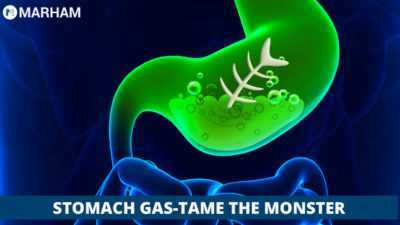Burping, belching, flatulence, and bloating are all terms for excessive Stomach Gas. While it may not appear to matter what you call it, knowing where the gas begins — and ends — can help you treat the painful and embarrassing symptoms. Burping and belching, for example, usually refer to gas escaping from the mouth, whereas flatulence, or farting, refers to intestinal gas escaping from the rectum. Bloating is a term used to describe the feeling of having too much stomach gas that hasn’t been released yet. Stomach Gas is caused by swallowing air while eating or drinking, and it is expelled through the mouth as a burp.
What factors cause Gas?
There are several main culprits when it comes to what causes gas:
- Eating high-fiber foods like beans, vegetables, and whole grains.
- Legumes, fruits,
- Drinking carbonated beverages
- Chewing gum
- Eating too quickly or talking while chewing, causes more air to be swallowed
- Using a straw
- Using artificial sweeteners
- Food intolerances such as lactose intolerance
- Bacterial overgrowth in the small intestine

Remedies to Avoid Stomach Gas
Come lets discuss now some remedies to avoid stomach gas;
Avoid Foods Known to Cause Gas
Eating fewer of the well-known gassy foods is one way to manage flatulence and belching. Among the most common offenders are:
- Fruits like apples and pears
- Vegetables like broccoli,
- Brussels sprouts, and onions
- Whole grains like bran
- Dairy products like milk, cheese, and ice cream
Drink Before Meals
If you drink liquids with your meals, your stomach acids are depleted, and you won’t be able to break down food as well, according to Novey. To help your stomach digest better, drink about 30 minutes before a meal. Consult our best specialists to discuss.
Eat and Drink Slowly
According to Bickston, when you eat or drink quickly, you can swallow a lot of air, which can cause gas. Is there a straightforward solution? When you’re eating, take it slowly. Check with your dentist if you have dentures to make sure they fit properly so you don’t gasp for air while eating.
Try Activated Charcoal
Activated charcoal may help to reduce and in treating excess gas and bloating, according to researchers. Activated charcoal, unlike the charcoal you’ll find in your grill or fireplace, has been given a special treatment that makes it safe to eat. When you take activated charcoal (in the form of a liquid or a pill), it binds to the fluid in your gut, potentially reducing gas and bloating while also making your stools firmer.


Don’t Fill Up on Air
Smoking, chewing the gum, and then drinking through a straw can cause your stomach to fill with air, which can result in gas. Consult our best specialists to discuss your problems.
Avoid Artificial Sweeteners
Many sugar-free foods contain sorbitol and related sugar alcohols, which can cause gas. “Sorbitol is frequently the first ingredient in any brand of sugar-free gum I’ve seen in local grocery stores,” Bickston says. “Eating one to two sticks is the equivalent of eating a prune.” However, the sugar substitutes found at a typical coffee shop or in popular soft drinks are not the ones that cause gas. Yellow (sucralose), pink (saccharine), and blue (aspartame) packet sweeteners are not linked to gas or laxative effects.
Try Herbs for Gas Relief
According to some research, a variety of herbs may aid in the relief of excessive gas. For example, according to a review published in the European Review for Medical and Pharmacological Studies in April 2015 ginger aids digestion. This is beneficial because if the stomach empties faster, gas can move to the small intestine more quickly, reducing bloating and discomfort.
Yoga Poses for Stomach Gas when hungry
Yoga poses can help your body relax and pass gas more easily. Here’s a good place to start:
- Extend your legs straight up with your feet together while lying on your back.
- Bend your knees and encircle them with your arms.
- Bring your knees up to your sternum.
- Pull your head up to your knees at the same time. If it’s more comfortable, you can also keep your head flat.
- Continue the pose for at least 20 seconds.

Bottom Line
Gas that has become trapped can be extremely painful. It’s usually nothing to worry about, but it could indicate a food intolerance or an underlying digestive issue. Keeping a close eye on your diet and taking some preventative measures can help. Getting quick relief may require some trial and error with various remedies to see what works best for you. Consult our best specialists to discuss.
You can book an appointment with the top Gastroenterologist in Pakistan through Marham by calling at Marham helpline: 0311-1222398 or by online booking facility through the website or Marham mobile app.
Can’t Find The App?
Android Users:
https://play.google.com/store/apps/details?id=controllers.marham.marhammed&hl=en
Drop a review for us at play store if you’ve had a good experience!
iPhone Users:
https://apps.apple.com/pk/app/marham-find-a-doctor/id1095243102
Stay Home. Stay Safe!
FAQ’s
Is garlic good for getting rid of gas?
Garlic. When it comes to bloating relief, garlic can be extremely beneficial. Garlic has been shown in studies to aid digestion and significantly reduce bloating. Garlic is also an antiviral and antifungal food, which means it can help the body break down food more easily if you suffer from gas.
How can I get rid of gas right away?
Activated charcoal and simethicone (Gas X, Gas Relief) are the most common medications that claim to relieve immediate symptoms. The best digestive aids are peppermint and peppermint oil, but there are many other foods that can help.
What positions aid in the passage of gas?
- Child’s pose (Balasana)
- Seated Forward Bend (Paschimottanasana)
- Two-Knee Spinal Twist pose (Supta Matsyendrasana)
- Wind-Relieving pose (Pawanmuktasana)

